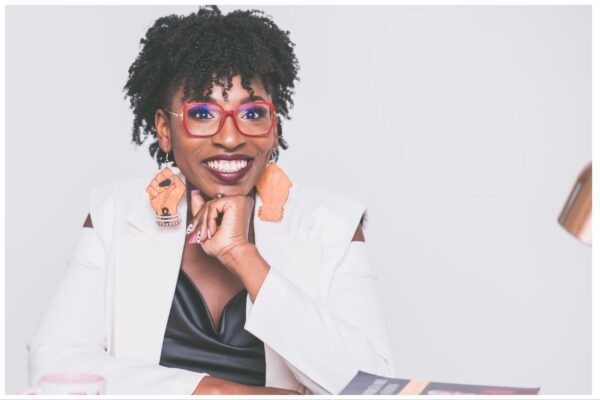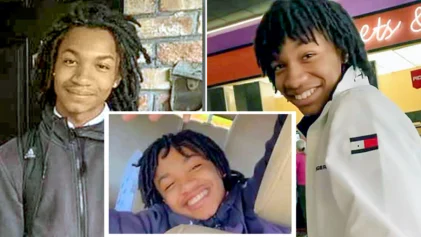A video of a Black psychologist discussing the three main talking points that her Black male patients bring up in their therapy sessions is sparking some discussion online.

Dr. Raquel Martin is a licensed clinical psychologist who specializes in Black mental health and wealth, and talks about all things relating to mental health, wellness and social justice on her social platforms. She’s racked up nearly 800,000 followers on TikTok and more than 180,000 followers on Instagram.
In one video that’s garnering a good amount of attention during Men’s Mental Health Month in June, she spells out the three main complaints that Black men discuss most during their sessions with her.
Before listing the complaints, she says these issues aren’t exhaustive, but they cover a majority of the pain points that her Black male patients experience.
That includes emotional expression problems, learning how to advocate for one’s self and numbing behaviors.
Martin says she often encounters patients who don’t realize they have emotional expression issues, particularly with an ability or tendency to recognize feelings, known as affect identification.
According to the National Institutes of Health, affect identification, also known as emotion identification, is defined as an individual’s ability to be aware of their responses in varied daily interactions.
“It’s the ability to identify your emotions, discriminate your emotions, and understand your range of emotions,” Martin said in an interview with Atlanta Black Star. “This means naming them appropriately and giving them latitude. Sadness and depression are two different things. Being happy and being ecstatic are two different things.”
She points out that some of these men often receive recommendations to go to therapy because don’t realize they have issues identifying their emotions, which can significantly impact and deteriorate their relationships.
On the point of self-advocacy, Martin says this issue perpetuates itself in situations where her Black male patients are being used in a number of different ways. Because they adopt and identify with expectations that are thrust upon them, they don’t realize that they’re more than those roles to which they become accustomed.
“A lot of my Black men patients will describe scenarios where they are objectively being treated inappropriately, objectively being invalidated, objectively being told their feelings don’t matter,” Martin explains in the video. “They’re just there to serve a purpose, which is either like money or sex or just to complete tasks and thinking that that’s normal for them.”
Actor David Mann revealed his struggles with depression during an interview on “The Tamron Hall Show” last October. He said he felt he couldn’t reveal those struggles partly because he had identified so strongly with his role as a caretaker for others.
In that same interview with Hall, Mann also said the only way he could grapple with and find relief from his mental health problems was by going into his office and sleeping.
As for the issue of feeling numb, Martin said, “I’ve had a significant amount of Black men patients state that they’re having difficulty feeling.”
She lists off examples like “using more substances,” increases in “risky behavior,” and “dangerous behavior,” as well as consistently playing video games without feeling a sense of pleasure and recreation. She underscores that these behaviors indicate that these patients don’t enjoy life activities anymore.
“They realize something is off, they realize they don’t handle certain things well, and they’re trying to improve themselves before they connect with someone else,” Martin states.
She recommended several methods Black men can employ to cope with emotional expression, self-advocacy and numbing issues — therapy included. However, her foremost piece of advice is to begin the process of looking inward and acknowledge if these issues are present.
“If you see yourself in these symptoms, you have to face that. You can’t heal what you don’t reveal,” Martin explained.
She also recommends decreasing time from numbing behaviors through different activities such as journaling, walking, working out, breathing exercises and grounding exercises.
“Tailor your coping skills to you. That’s why it’s helpful to know what you’re feeling in your body.”
Martin told Atlanta Black Star that several mental health issues that are prevalent in the Black community are actually heavily linked to racism and the way America treats Black people.
“Black people are often shown that it’s not safe to express their emotions. That stems from adultification and dehumanization,” Martin said.
Black children are often taught by their parents that they must be tough because the world is tough on them. Adulitification connects directly to the over-masculinization of young Black boys and the over-sexualization of young Black girls.
To repair those effects, Martin encourages creating safe spaces at home where Black men can feel secure and open to sharing various troubles and traumas. If the home environment is where many emotional issues start, it’s where they can be resolved, Martin points out. She finds that even in relationships and within marriages, it’s imperative to establish those spaces at home, especially since the world doesn’t do enough to validate Black people.
In an interview on the “BIG FACTS” podcast last year, rapper Kevin Gates talked about his fight with depression and how many men suffer in silence, especially if they don’t feel like they can vocalize their emotions to those in their own homes.
“The world is tough so we have to provide a safe space to land. It can be really helpful to validate Black men. When you think about validating, it’s about acknowledging their thoughts, emotions, and experiences. It lets them know their relationship with you matters,” Martin explained. “It’s about being present. It’s OK to say, ‘I don’t know what you’re feeling, but I want to. I don’t understand, but can you help me?’ This world invalidates us, so don’t let your home be a model of the way the world treats you.”
Martin said she wants Black men to understand they deserve spaces where their validation is prioritized, inside and outside the home. Therapy is just one of those spaces.
“You can just come to therapy because you want to have someone to talk to and have a therapeutic alliance with someone that does not invalidate you,” she said. “There’s no specific reason to go. Just go. It’s not an act of violence to say you need therapy. We deserve therapy. We deserve the experience. We deserve an environment that affirms us and helps us become the best versions of ourselves.”
You can find more resources, including a guide to finding a therapist on Dr. Martin’s website.


